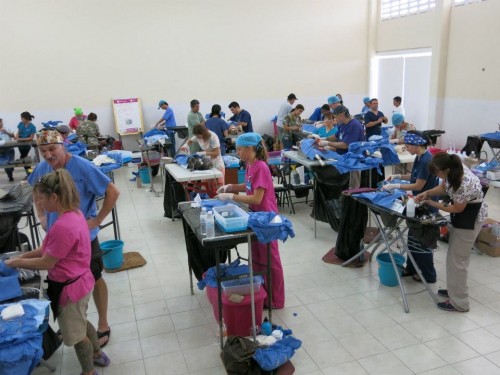Veterinarians from around the globe will descend this week upon Yucatan for the annual Spay and Neuter Campaign. The “Snip and Clip” clinics will be held in Merida, Progreso and Kanasin between Jan. 9 and Jan. 16.
The low-cost clinics are sponsored locally by Planned Pethood, Dr. Antonio Rios, and supported by Dr. Jeff Young, Planned Pethood International, Denver, Colorado. For the last seven years, every January, these veterinarians along with an army of volunteers have committed to work a week of long hours to spay and neuter thousands of companion animals.
What began as a vision by Dr. Jeff has materialized into a successful campaign addressing the critical situation of animal overpopulation, not only in Yucatan but India, Slovakia, Panama, Hungary, Poland, Turkey and Native American Reservations.
When Dr. Rios, (affectionally called Dr. Tony) met Dr. Jeff, he quickly grasped how a spay and neuter campaign in Merida could make a difference in the lives of dogs and cats in Yucatan. The goals, though simple, are long term: “Resolve the problem of companion animal overpopulation through EDUCATION, LEGISLATION and STERILIZATION.” Planned Pethood is proud to say since they opened their doors, they are responsible for sterilizing over 100,000 animals in Yucatan.

Spay/neuter clinics will be held in Merida, Progreso and Kanasin Jan. 9-16. (PHOTO: Melody McNarland)
Research indicates communities with active high-volume spay and neuter campaigns have reduced the number of shelter intakes and euthanasia. Cost is the reason many pet owners do not spay and neuter their pets. Low-cost or free spay and neuter is the only way to reach these segments of companion animals. It is not an overnight solution or a quick fix, it is a long range solution and requires commitment from those involved.
Two thousand one hundred animals sterilized in the course of a week sounds like a lofty goal, but certainly doable. An undertaking like this requires not only the veterinarians, vet techs and volunteers; it takes money! Every year the local government is solicited for sponsorship, and although they often provide money for some medical supplies the remaining cost is covered by independent sponsorships and donations. The average cost of a week long clinic is between $60,000-$70,000 USD, $33 per animal. This cannot happen without the generous donations from the community. By volunteering and donating you become part of the solution.
Here is the schedule for the spay/neuter clinics in Yucatan:
January 9, 10 Progreso, Local Social El Ejidal, in front of water tower.
January 11, 12, 13 Merida, Parque Hunab, Calle 29 x 48 y 48, Colonia Nueva Yucatan.
January 15, 16 Kanasin, Polifuncional, near Municiple Palace of Kanasin.
To donate or volunteer, contact:
Karen Cloutier or AFAD Progreso English on FaceBook for Progreso donations.
Source: TYT Newsroom


